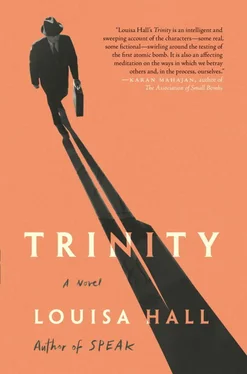Now, of course, I can see there were other factors at work. Youth, for example. And stupidity. The fact that we were at war, and the general randomness of existence.
Some planes stay up, some planes go down. Some secrets come out right away, and some of them stay secret forever. I know that as well as I know the back of my own hand, but even now, all these years later, if I step into that restaurant I can start to feel dizzy.
It’s as if things might start falling to pieces again, now that the door’s been reopened. Then it’s as tempting as ever to line up all the facts as they happened.
FOR A MOMENT, FOR INSTANCE, WHEN OPP STEPPED OUT THE BACKdoor of the Radiation Lab, he stood still and stared out at the bay.
He didn’t move. He had the unfocused stare of a blind man, and for a moment I wondered if he needed glasses.
All day, he’d proceeded crisply through his appointments. I assumed he knew that we were behind him. He seemed to be checking off all his preapproved duties, acting in the exaggeratedly purposeful way a person would act if he knew he’d been followed.
From the airport, he headed straight for the Rad Lab, as he’d promised to do. The whole point of the trip, as he’d explained it to Security at Los Alamos, was to go back to Berkeley to interview potential assistants. He spoke only to the graduate students he’d listed. Everything went according to plan. The whole trip was running perfectly smoothly until that strange moment when he stepped out the back door and peered off into the distance, as if he’d been blinded.
Then, abruptly, he headed off toward the station. I followed behind him. He was walking fast, heading down University Avenue. That hadn’t been preapproved. I wondered if he thought that he’d lost us, simply by stepping out the back door of the Rad Lab.
It was a sunny afternoon. He was wearing that porkpie hat. One of his hands was stuffed in his pocket. The other hand was curled in a fist, and he refused to look over his shoulder.
Not once, the whole time, did he look back to see me.
That’s how I knew he was on his way to do something we would have refused. He wouldn’t look back. He stayed on the shady side of the street and shifted his weight side to side if he ever had to stop at a streetlight.
Even when he got to the station, he didn’t stop moving. He charged through the front doors and through the main hall as if he planned to sail straight on out again through the opposite exit.
He was still sailing when he glanced up at the departures list. Overhead, on the board, the slats clacked away briskly, like dominoes falling. Then, for the first time since he left the Rad Lab, he pulled up short. He must have realized his gate wasn’t open.
FOR A MINUTE, HE STAYED WHERE HE WAS, LOOKING UP AT THEboard. Even then, he refused to glance back.
In his position, another man would have been jumping out of his skin. He’d stepped out of the itinerary given to him by General Groves, carrying top secret nuclear information. He knew that we had evidence of espionage on the mesa. He knew that no matter how firmly General Groves was behind him, his former involvement with Communist groups meant he wasn’t above our suspicion.
Another man would’ve checked for tails every two minutes. But Opp didn’t look once. He must have known we were behind him. He just didn’t want to admit it.
With one hand still clenched in his pocket, he stood peering up at the board as if he couldn’t believe it. It took him a minute to accept the fact that his gate was really closed. Then he turned away and kept moving.
He headed for the café. He bought a newspaper and a small coffee. Then he left a tip on the counter and went to the window.
He drank standing up, without any apparent enjoyment. And he was still gazing blankly off into the distance, as if the scene in front of his eyes—the station, I mean, and the people coming and going, the shoe blacks and the women in heels and the GIs with their duffels—didn’t exist. As if that station had been replaced by some other station, or some other, different version of this one.
WHILE HE FINISHED HIS COFFEE, I FOUND A PAY PHONE THAT KEPThim in my sight line.
What is it, Pash said when I’d reached him in the office.
Opp’s flying the coop, I said.
What do you mean he’s flying the coop? Pash said, after a moment.
He left the Rad Lab. We’re at the station. I think he’s heading into the city.
Jesus Christ, Pash said. Jesus Christ, the fucking Red bastard.
I could hear him breathing into the telephone.
Do you want me to stop him? I said.
Stop him? Pash said. What the fuck are you talking about? Why the fuck would you do that?
I didn’t answer. Pash made several odd snorting noises.
No, he said. No, no. Don’t intervene. Don’t fucking intervene. I have to phone Washington first.
He paused, snorted again, then caught his breath.
Just don’t fucking lose him, he said. Remember your fucking directives. I’ll have Frank meet you out front in the De Soto.
AFTER THAT, AT A KIOSK BY THE PAY PHONE, I BOUGHT SOME CASHEWSand a Chronicle . While I waited for change, I opened the paper, then snuck out my camera. Over the rim of the front page, I photographed Opp a few times.
Then I glanced down again at the headlines. FORTRESSES SMASH KIEL, BREMEN , they said . 26 LOST IN BIG DAYLIGHT BATTLE.
I put a cashew in my mouth, but it was too salty to swallow. Then I focused again on Opp’s face: dark eyebrows, high cheekbones, that beak of a nose.
Every so often, he brought his coffee up to his mouth.
The longer I focused, the less human his face seemed. His jaw was like a grasshopper’s jaw. Then after a while it wasn’t a jaw, just an inhuman apparatus.
At 5:07, he brought his watch up to his face. Then he moved out of the frame. I folded up my paper and followed.
ON THE TRAIN INTO THE CITY, HE TOOK A SEAT BY THE WINDOW LIKEany other man on his way in to work. I watched him over the paper, trying not to get caught up in the headlines. I must have, though, because I remember them still. There were a lot of headlines that day. COSTS HELD “NOT TOO HIGH FOR RESULTS,” was one of the ones I remember. And U.S. FLIERS DOWN 25 ZEROS OF 50 IN SOLOMONS BATTLE.
That kind of thing. All the headlines you get during wartime, mathematical calculations of loss.
I tried not to let them distract me. I focused on the side of Opp’s face, that strange apparatus. He was in possession, I thought to myself, of secrets that could potentially wipe out the planet.
That’s as much as I knew. He was working on a weapon that could potentially wipe out the planet.
And there he was, a quiet man in the seat by the window.
ONCE WE’D MOVED OUT OVER THE BAY, THE WATER MADE ITSELFknown. It was so bright and vast, stretching off into the haze. Opp looked out the window. Then, when the train pulled into the tunnel through Yerba Buena, he got up and went to stand by the door. Once again, he faced out the window, but now, in the tunnel, there was nothing to see. Only a light passing, every so often, from an occasional dead man’s hole in the darkness.
I tried to imagine what he could be thinking. Maybe he was counting the holes. Maybe he was watching his own reflection, swimming on the glass in the window. From the side, he looked blind and determined, like a man getting ready to make a mistake, the inevitability of which he’s already accepted.
Or maybe that’s just what I saw. It’s possible I was reading him wrong. Like I’ve said, I slept badly that summer. Sometimes I was up all night on the job. Other nights I was at home, and I still had trouble sleeping. Once I’d turned out the lamp, there was always that conversation with Warren to go over again.
Читать дальше












